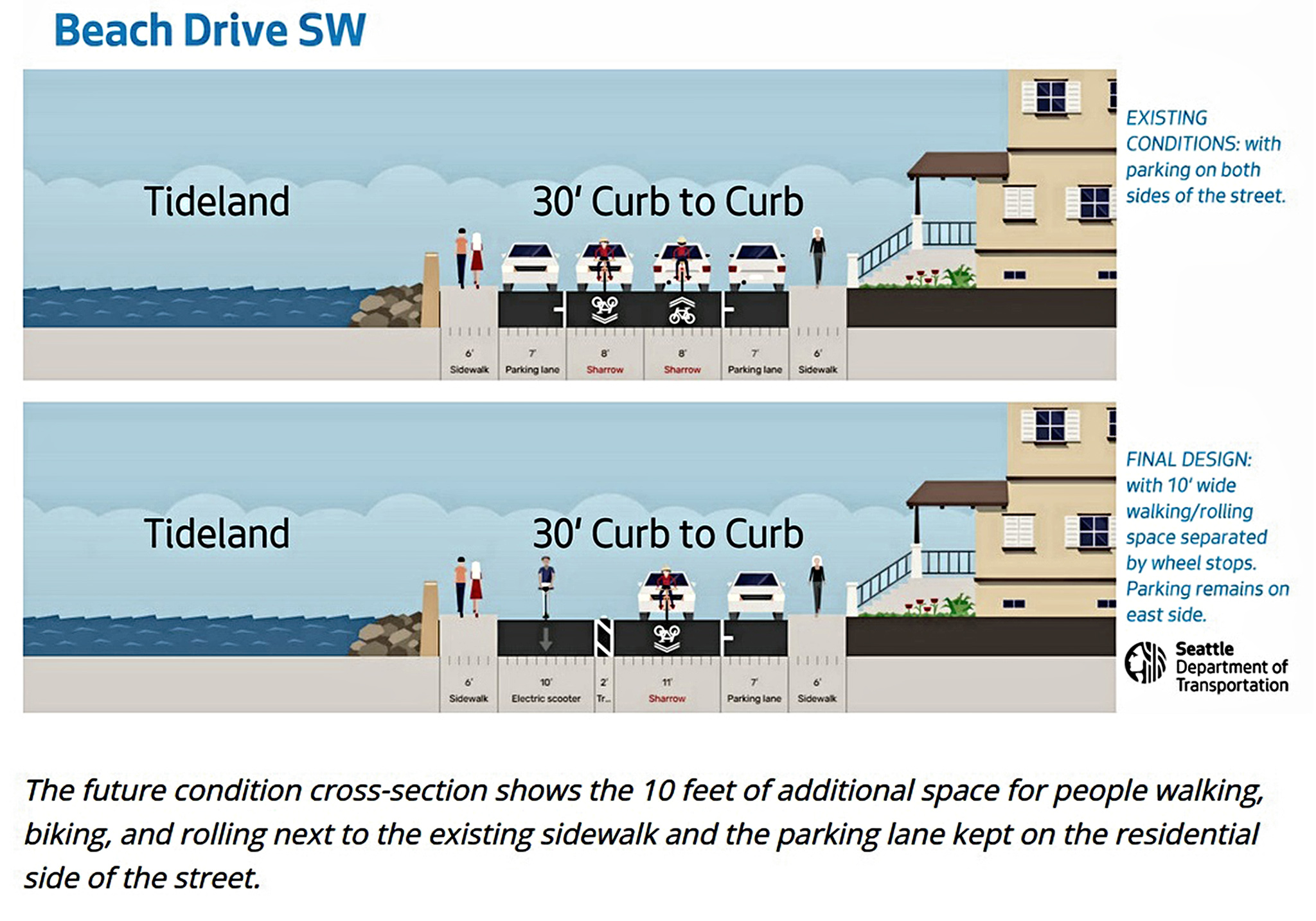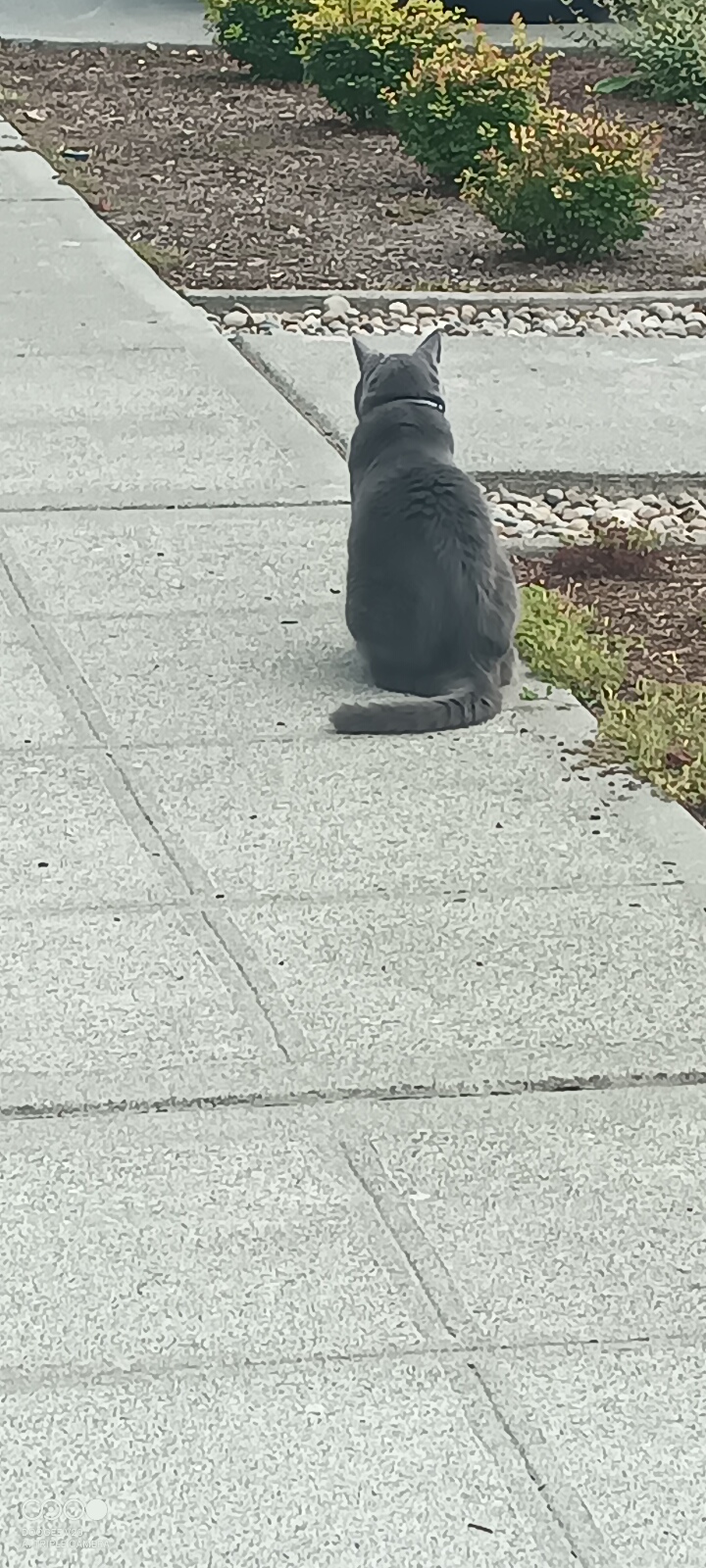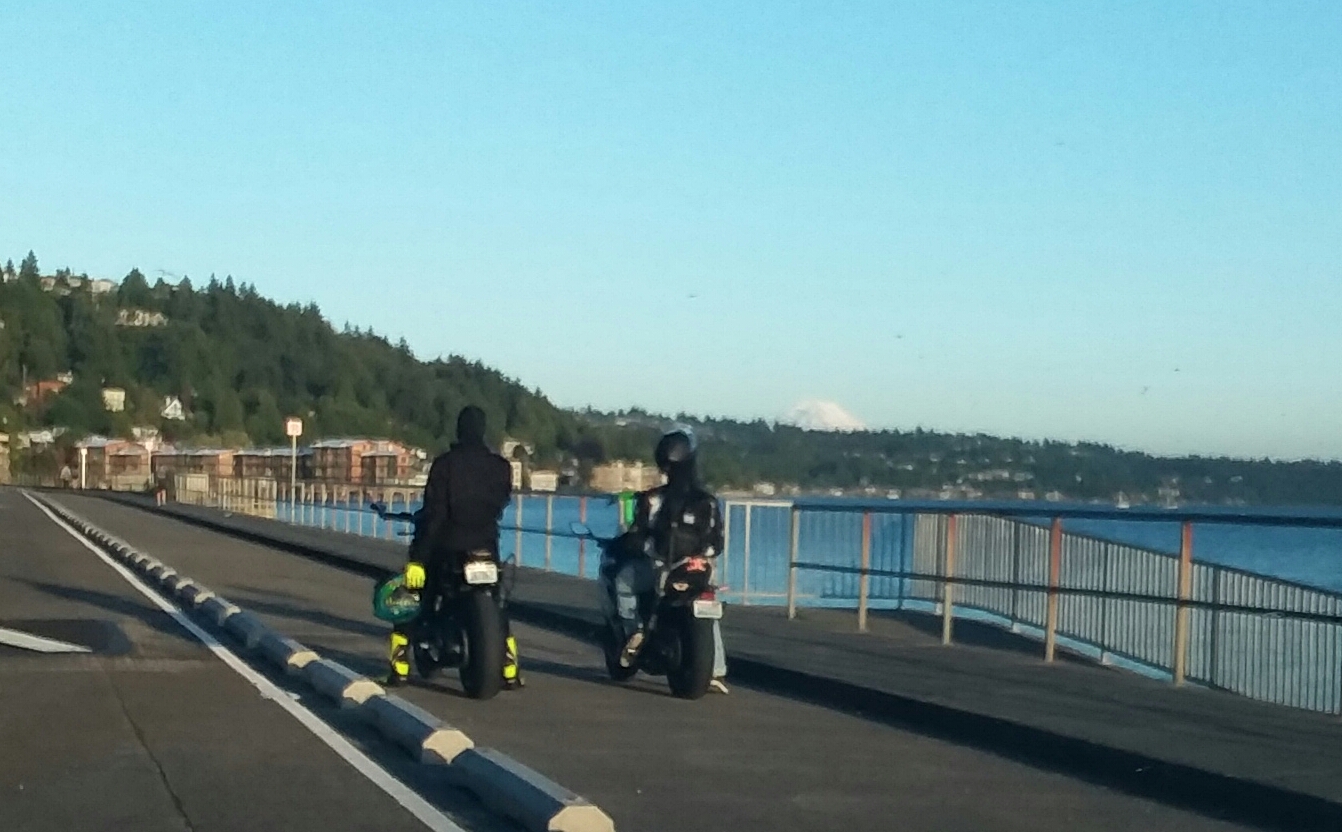 (WSB photo, late Tuesday afternoon, Beach Drive alongside Constellation Park)
(WSB photo, late Tuesday afternoon, Beach Drive alongside Constellation Park)
By Tracy Record
West Seattle Blog editor
Members of the Alki Point for All group tried last night to focus on what they propose, in addition to what they oppose.
The latter – the permanent features planned for the Beach Drive stretch of the city-designated Alki Point Healthy Street, particularly the foot/wheels path that will replace some parking spaces.
The former – traffic-calming alternatives such as street art.
Though SDOT has said repeatedly that construction is imminent, they are hopeful they can find a way to stop it. “I know we can do this,” said organizer Donna Sandstrom of The Whale Trail toward the end of the hastily called meeting at C & P Coffee (WSB sponsor), attended by 20+ people.
Another coalition member, longtime West Seattle architect and community advocate Vlad Oustimovitch, said, “I am absolutely certain there is a a way almost everyone can be accommodated in a plan and feel good about it – this (SDOT plan) is (not it) – there is a way to step back and look at it.” He offered examples of street redesign including large-scale pavement art.
Sandstrom added, “We’d like to see the STREET CLOSED sign replaced with WELCOME TO (the park) … GO SLOW … we think there is a version of the Healthy Street that meets the greater (good).”
Other coalition members introduced by Sandstrom included longtime volunteer responders from Seal Sitters Marine Mammal Stranding Network. They explained that they are the ones whose work is potentially most impacted by the removal of shore-side parking, as they haul equipment such as sandwich boards and tape to beaches where harbor seals, sea lions, and other marine mammals strand.
Sandstrom stressed that they are not just concerned about their own access; she said SDOT offered them their “own private loading zone.” They are worried about all the other people who they say flock to the area for activities such as storm watching and tidepooling as well as whale watching and “seal-sitting.” Retirement homes bring vans full of people to park and enjoy the view, she said. “It’s important to a lot of people for many reasons, for generations.”
For the purposes of her organization – which has interpretive signage at 130 sites along the west coast of North America, where whales – especially Puget Sound’s endangered Southern Resident Killer Whales – might be seen. She estimates having helped thousands of people watch and learn about them from Constellation Park.
Victoria Nelson from Seal Sitters explained that the volunteer-powered organization has a “binding agreement” with the federal agency NOAA to tend to marine mammals that show up on the beach, alive or dead. “We are not just looking at seals – they are an indicator species on the Sound – if they’re ill they could be a danger to the community.” They partner with the organization SR3 to rescue and treat ailing animals.
 (File photo of Constellation Park tidepooling, courtesy Alki Point for All)
(File photo of Constellation Park tidepooling, courtesy Alki Point for All)
Then there are the Seattle Aquarium‘s volunteer beach naturalist events at Constellation Park during low-low tides (the Aquarium is not part of its effort but local resident Buzz Shaw, who said he helped launch the program and was long involved with it, is). Those draw hundreds, Sandstrom said: “People are making connections to the Sound that can inspire conservation.”
She then recapped the four-year history of the Alki Point Healthy Street (Beach Drive and Alki Avenue, west of 63rd to where they meet at the point). Though the city touted surveys showing support for banning through traffic on the stretch, Sandstrom and other coalition members contend, the city never asked whether the plan – originally a Keep Moving Street early in the pandemic, now a Healthy Street – should be implemented, only how it should be implemented. Late last year “we were all surprised when they revealed a final design calling for the removal of 62 parking spaces,” she said, explaining that she didn’t feel she could sit back and watch it happen, because the changes already have depressed turnout when whales are present. People see the STREET CLOSED signage and turn around – “how is the impact being measured?”
Nelson said she originally was assured “no legal parking would be removed.” (This was reiterated on the city website, as shown in our February report.) Without the water-side parking on that stretch, she said, volunteers can’t “retreat to our car within line of sight” of the animals they’re watching. And people seeking to pull over and enjoy the view for a moment won’t be able to.
The coalition believes the decision wasn’t made with public comment aside from that early survey, and they’re skeptical about its participation – “58 percent residents, not a representative sample of who uses Alki Point.”
And yet, Oustimovitch said access to Constellation Park is important for people around the region. “It’s an entry drug to environmentalism.” That’s when he showed the example of a street in Asheville, North Carolina, with “illustrated pavement,” saying that immediately signifies it’s “public domain” – and yet the parking remains (added: here’s a safety study of similar projects) . “We have a whole arts community … that I’m sure would be really happy to be involved.” Maybe, he suggested, paint an “oversized octopus” onto the street. But instead, in his view – which includes 45 years of urban design work – “SDOT is erring on the side of brutal engineering options.”
They did get an audience with the city two weeks ago, Sandstrom said, but even after their presentation, like the one they gave last night, the department said it’s “going to proceed with construction as planned … and see what problems arise” (if any). Sandstrom said SDOT liked the “Welcome” sign ideas – “they’re going to put them right next to the ‘Street Closed’ signs.” The mayor’s office also told them they intended to let SDOT go ahead, she said, and evaluate it after a year. Nonetheless, she said, the coalition wants to figure out how to “halt construction, open the discussion, arrive at solutions that meet the needs of the wider community.” But time’s running out, she acknowledged, if they can’t generate “a lot of noise and heat” to convince the city to hit the brakes.
The subsequent Q/A and discussion was wide-ranging. Not everyone present was a supporter; one attendee said the coalition should be concerned about 15 storm drains that carry automotive fluid and debris into the Sound, unfiltered. She and Nelson engaged in a back and forth, with Nelson ultimately suggesting they could and should work together on a “surgical” solution to the road’s problems, not the planned blanket restrictions. (Sandstrom at one point addressed those who’ve said to her “how dare I be a conservationist and promote the use of cars … if there was another way to get (to Alki Point) but we’re not there yet … better thing is to give more people the chance to see (the whales) in their home.”)
Another person said he lives in the Alki Point area and was opposed to the Healthy Street restrictions until he saw how well they were working to calm the area, which had historically been a magnet for driver gatherings, partying, littering, and racing (as we reported in 2020, local police acknowledged the street restrictions were a way to solve that recurring problem). So he spoke repeatedly in favor of proceeding with the city’s plan, including declaring, “We’re talking about the convenience of parking for humans vs, the environment.”
Some suggested alternatives – what about closing the street at night and leaving it open all day? What about making it a one-way street? Sandstrom said they would love the chance to work with local residents on solutions “if we could just convince (the city) to go back to the table.” Another supporter warned that once the parking’s gone, “it’s never coming back – it’s gone forever . the only way to stop this thing, is to stop this thing.”
But how?
There may be legal criteria that would be an argument against restrictions, it was suggested – denying access to the shoreline? Thwarting specific educational uses of the waterfront? Legal action is possible, agreed Sandstrom, “some members of our group might be in favor” – but, she stressed, they strongly prefer to make progress through “persuasion.” But respectful persuasion, no demonstrations, sit-ins, picketing, etc. – “real discussions between real people is what I want to foster.”
Another attendee suggested that the city is “picking the wrong place, the wrong Healthy Street to advance … pitting people who care about good things (against each other).” And one who said she’d been in West Seattle a year after previously living in Fall City and bringing schoolchildren here at low tide noted that she knows people who have been scared away from the park by the “street closed” signage.
After two hours, the meeting ended with Sandstrom reminding attendees about their online petition and other potential action steps, inviting anyone interested in working with them to let them know.







 Photo taken around 6pm on a warm sunny evening the day before the NP signs went up. I live a couple blocks away and this is typical. Not congested – ample space for pedestrians, joggers, rollers! I walk here on a daily basis, year round – weekends and weekdays.
Photo taken around 6pm on a warm sunny evening the day before the NP signs went up. I live a couple blocks away and this is typical. Not congested – ample space for pedestrians, joggers, rollers! I walk here on a daily basis, year round – weekends and weekdays. 

| 72 COMMENTS